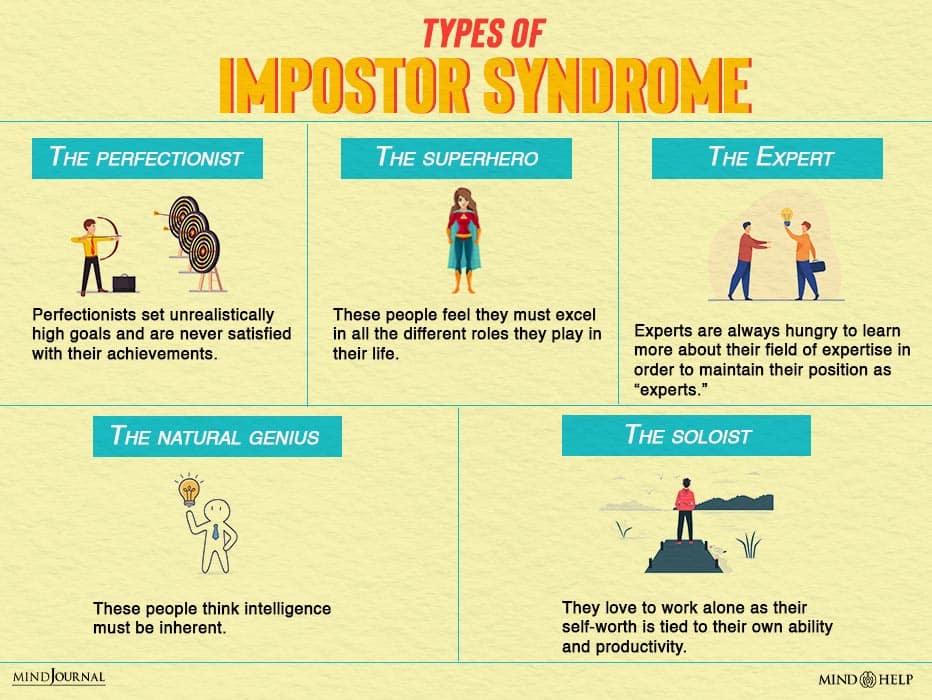Imposter syndrome is slowly becoming a very common thing nowadays, with almost everyone you come across suffering from it, especially working people. Life and building a career have become so cutthroat, ruthless, and stressful that no matter how much you work hard, you still feel that you’re not doing enough and that you can do more.
Feeling doubtful about yourself sometimes and wanting to be better at what you do is a normal feeling to have, but when you constantly feel like this, no matter how much you achieve, that’s when it becomes a serious problem. Not being able to acknowledge your accomplishments and hard work is a giveaway of imposter syndrome.
Let’s find out what’s imposter syndrome and what it looks and feels like.
Related: Why Successful, Confident People Still Feel Inferior Or Incapable
What Is Imposter Syndrome?
You know you are experiencing imposter syndrome when you feel incompetent and a fraud on the inside, even if other people consider you to be talented, hardworking, and successful. No matter how much you accomplish in life, you either feel like a fraud, or you feel like you haven’t done enough to deserve success and adulation.
You feel like a phony all the time, and keep pushing yourself to be even better. This results in you feeling even more stressed out and burned out. Even though imposter syndrome is not a diagnosable mental illness, it’s a hard thing to deal with, mentally, emotionally, and psychologically.

Signs Of Imposter Syndrome
Some of the common signs and symptoms of imposter syndrome are the following:
- Feeling guilty about the success you’ve achieved.
- Constantly doubting yourself and your abilities.
- You are a toxic perfectionist, who always wants perfection in everything you do, otherwise, you are dissatisfied.
- Finding it hard to believe people when they appreciate and compliment you.
- You set really challenging goals and then feel crushed and disappointed when you’re not able to achieve them.
- Firmly believing that it was luck, not talent and hard work that gave you the success you have today.
- Feeling like you don’t deserve the success you have achieved.
- Obsessing about the smallest mistakes you make, which most of the time are irrelevant and negligible.
- Working very hard to conceal your flaws and failures so that people don’t judge you and see you as “imperfect”.
- Undervaluing your skills, talent, and abilities.
- Undermining or ignoring positive feedback.
- Feeling depressed and anxious.
- Always overpreparing because you constantly feel like you will fail.
- Not trusting others, and refusing to ask for help when things get too stressful and overwhelming due to the fear of being exposed as incompetent and not good enough.
Related: 7 Signs of Imposter Syndrome
Common Statements Of Imposter Syndrome
These are some of the common statements people make if they are experiencing imposter syndrome:
- “I will be exposed as a fraud very soon.”
- “I am not good enough.”
- “What I am doing is not enough, I need to push myself harder.”
- “It’s because of luck that I am successful.”
- “I had a lot of help.”
- “Failure is never an option. If I fail, I am useless.”
- “I am incapable of living up to everyone’s expectations of me.”
- “I don’t deserve this success.”
- “Anybody can do what I have done. Anybody can achieve what I have achieved.”
- “If I can be successful, anybody can be successful.”
- “If someone is complimenting and appreciating me, they’re just being nice.”

5 Types Of Imposter Syndrome
There are five types of imposter syndrome, and it’s important to understand all the types if you are wondering how to overcome imposter syndrome.
1. The Expert
The expert feels like a fraud and an imposter when they see that they don’t know everything about a particular topic or issue. Unless they know every detail about something and have all the information, they feel incompetent.
They always feel that there’s so much more to learn, and unless they do that, they can never be an “expert” in the truest sense.
2. The Soloist
When you ask for help to achieve something or reach somewhere it ends up making you feel like an imposter. Because you have not done everything yourself, and you asked for help, it minimizes your achievements in your eyes.
You didn’t reach where you are solo, and that makes you question your abilities, talent, and competence.
Related: 7 Imposter Syndrome Myths You Should Know About
3. The Perfectionist
This type of imposter syndrome is pretty self-explanatory. You want everything to be absolutely perfect, and if it’s not, you feel like an imposter. It’s not perfectionism you chase, it’s toxic perfectionism.
If things are not 100% perfect, you keep on telling yourself that you are not as good and talented as people think you are.
4. The Superhuman
If you think like a superhuman, then you’re someone who firmly believes that you always have to be the hardest worker in the room and have the most number of achievements amongst everyone, otherwise you’re an imposter.
This ends up taking a toll on your physical, mental, and psychological health, but you still don’t stop.
5. The Natural Genius
If you suffer from this type of imposter syndrome, then you feel incompetent if you are not naturally gifted, talented, and intelligent. If you don’t succeed in your very first attempt, or it takes you a bit longer than others to master and learn something, you feel like a fraud and imposter.

How To Deal With Imposter Syndrome?
1. Understand and acknowledge your anxiety and fear.
The first step to dealing with imposter syndrome is to acknowledge that you have imposter syndrome. You have to acknowledge the fear and anxiety you feel, otherwise, you will never be able to overcome this. Remember that feeling like this sometimes is completely normal, and you are not alone in this.
Imposter syndrome normally shows up when you are given important opportunities, and somewhere deep inside you, there’s a small doubt about whether you will be able to do it or not. Don’t think from the outset that you can’t do it, and speak to yourself in a confident and kind way.
Related: 6 Hacks For Battling Imposter Syndrome
2. Know the difference between fear and modesty.
When you are undermining your achievements, are you being humble or is your imposter syndrome making you feel fearful? Try and learn the difference between the two, because this can go a long way in overcoming imposter syndrome. Being humble about your work and accomplishments is an amazing quality to have, but feeling inadequate and scared to acknowledge your effort is not.
Dealing with imposter syndrome means striking a perfect balance between feeling proud of what you have achieved, and not becoming arrogant about it. Acknowledging your efforts and achievements without feeling like an imposter is the ultimate goal.
3. Stop thinking that you need to be a perfectionist.
Perfectionism to some extent is fine, but when you cross over to the toxic perfectionism territory, that is when you know you need to take a few steps back. Wanting to give something your all is okay, but not at the sake of your mental health. Also, perfectionism is overrated, you know.
Obsessing about perfectionism only ends up making your imposter syndrome worse. You feel like an imposter because you compare yourself with “perfection” which most of the time is impractical, illogical, and unrealistic.
4. Treat yourself with kindness and compassion.
Last but not the least, if you want to deal with your imposter syndrome, then you need to learn self-compassion and self-acceptance. If you keep on berating yourself for not being perfect, for not being good enough, talented enough, or not successful enough, you will be stuck in this vicious spot.
Self-acceptance and self-compassion are the only ways through which you can be comfortable and happy with yourself. Because at the end of the day, life is not just about your achievements and accomplishments, it’s so much more than that.
Related: How To Defeat Imposter Syndrome and Bring Success Into Your Life
Do any of these signs resonate with you? Let us know your experiences and thoughts in the comments down below!










Response
4.5